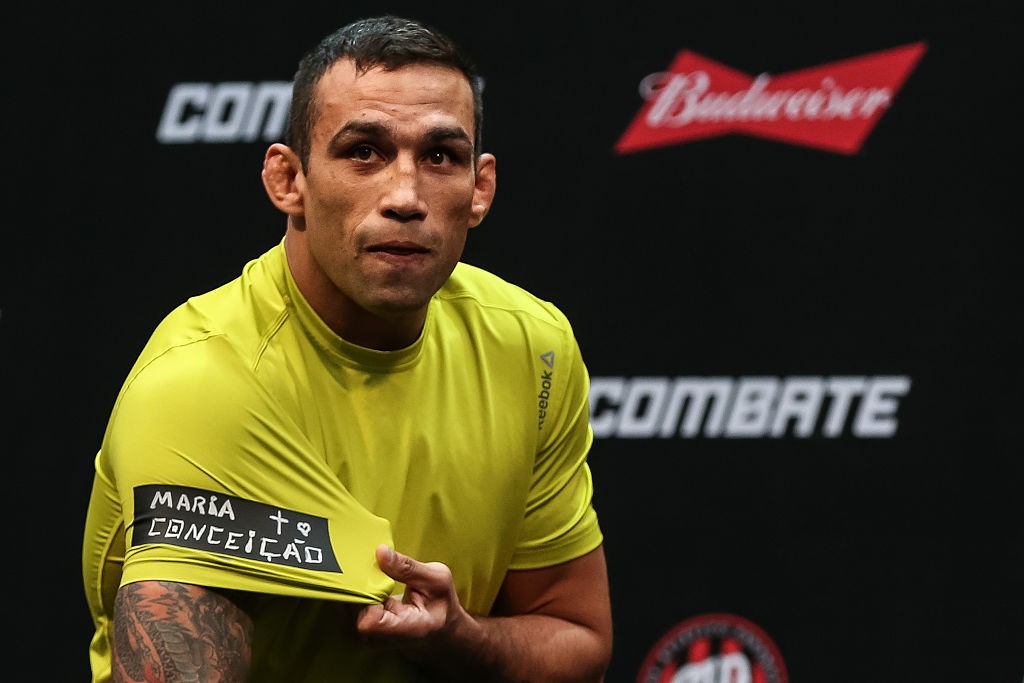Fabricio Werdum Discusses the Regrettable Reebok Protest
Former UFC heavyweight champion Fabricio Werdum has expressed regret over a joke he made about the Reebok deal, which resulted in harsh retaliation from the UFC. In a recent episode of his podcast, ‘Nem me Viu,’ Werdum discussed the consequences of his actions. He had posted a photo of himself wearing the Reebok kit with the Nike logo photoshopped on the shirt as a form of protest against the loss of private sponsorships due to the Reebok deal. The UFC did not take kindly to his jest and removed him from his Spanish language commentating role.

Reflecting on the incident, Werdum acknowledged that it was a mistake to go against the company that employs him. He learned a hard lesson that it’s not wise to play with the hand that feeds you. He revealed that his sponsorship earnings had significantly decreased from $200,000 to $10,000 after the Reebok deal, prompting him to engage in a playful protest. However, this resulted in him being removed from the UFC’s Spanish broadcasts for four years.
Werdum’s regret over the incident is evident as he emphasized that going against the company is not cool and that he had said something stupid. The repercussions of his actions had a lasting impact on his career and serve as a reminder to others to be cautious when challenging the organizations they are affiliated with.
The incident occurred in 2016, and at the time, Werdum addressed the situation on his personal Instagram profile, clarifying his protest against the sponsorship changes and how it affected fighters’ earnings. He mentioned that he didn’t have a contract with Reebok, but he was removed from TV broadcasts as a consequence.
Werdum’s experience highlights the importance of understanding the dynamics between athletes and the organizations they represent. It serves as a cautionary tale for fighters and professionals in any industry to consider the potential consequences before engaging in actions that may jeopardize their standing and relationships with their employers.
“It’s not cool to go against the company,” Werdum explained. “I’ve been through that before. I said something stupid and I regret it. It’s just something that happened, you shouldn’t go against the company. When Reebok became the UFC’s official sponsor, I went from making 200k in sponsors to 10k. Then I, in a sort of playful protest, removed the Reebok logo from my shirt and replaced it with the Nike logo. I started a campaign and everything. I was the UFC’s commentator for their Spanish broadcasts, but I ended up being removed from it for four years.” [Via/ Bloody Elbow]
The UFC Reebok Deal: A Controversial Partnership that Divided Fighters and Fans
In a landmark move for the world of mixed martial arts, the UFC (Ultimate Fighting Championship) announced its partnership with Reebok in 2014, initiating a comprehensive uniform policy that would replace fighters’ individual sponsors with a standardized Reebok kit. The deal, initially hailed as a step towards professionalism and uniformity, soon became a lightning rod of controversy, drawing criticism from fighters and fans alike.
The headline-grabbing deal, reportedly worth around $70 million over six years, aimed to streamline the look of UFC fighters and create a more consistent brand image. However, it led to significant financial losses for fighters who relied heavily on sponsorship revenue from their personal endorsements. Many fighters expressed their frustration at the limited opportunities to monetize their individual brands and the substantial decrease in earnings resulting from the Reebok deal.
The controversy surrounding the UFC-Reebok partnership reached its peak when fighters began openly criticizing the lack of financial compensation and the absence of freedom to display their own sponsors. Some fighters even resorted to tape or markers to cover up the Reebok logos during their fights as a form of protest.
Despite the initial backlash, the UFC stood firm on the Reebok deal, asserting that it was a necessary step towards creating a more professional image for the sport. The uniform policy was also intended to prevent potential conflicts of interest between fighters and their sponsors, ensuring fair competition.
While the UFC-Reebok partnership did bring a sense of uniformity to the Octagon, it ignited a firestorm of debate regarding fighter compensation, individual branding, and the balance between uniformity and personal expression in a sport known for its diversity. The legacy of the UFC-Reebok deal continues to shape the landscape of MMA sponsorship and remains a contentious topic within the community.
More MMA news
- Conor McGregor calls Khabib Nurmagomedov “homophobic” in crazy deleted rant
- Kamaru Usman open to Middleweight move after UFC 261 but on one condition
- Jiri Prochazka says Khabib Nurmagomedov, Conor McGregor and others inspired him
Follow our dedicated MMA page for instant MMA news and update
